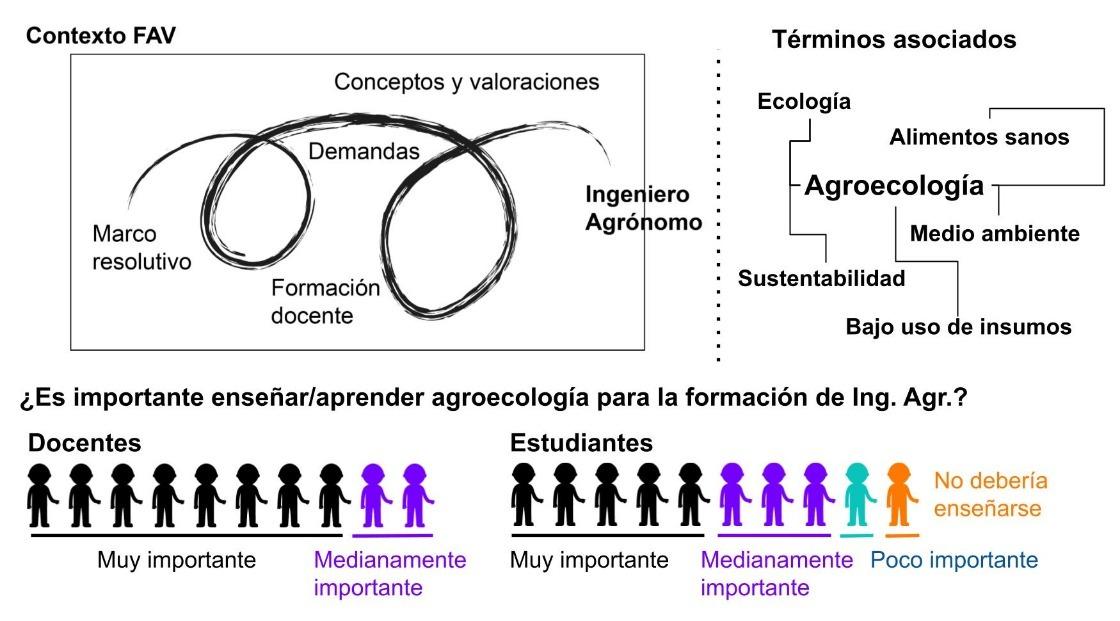Agroecology as Key: New Paradigms, New Professionals
DOI:
https://doi.org/10.63207/ai.v8i15.150Keywords:
agroecology, curriculum changes, vocational trainingAbstract
The input-dependent productive model has achieved considerable increases in crop productivity per unit area, despite this, it is currently being questioned due to the ecological and sociocultural problems it is generating. This makes the disciplinary field of the agronomist demand a new way of intervening in the rural environment, the agroecological paradigm being an alternative capable of overcoming the limitations of the current hegemonic model. In the present work, a diagnostic investigation was carried out that sought to investigate the conceptions and positions in relation to the inclusion of the agroecological paradigm in the professional training of the Agricultural Engineer of the Faculty of Agronomy and Veterinary Medicine (FAV) of the National University of Río Cuarto (UNRC). The results obtained allow us to affirm that there is a good predisposition on the part of teachers and students to incorporate more environmentally friendly paradigms in the curriculum. Likewise, it was found that in almost half of the subjects of the degree, topics related to agroecology are already discussed, although only in some is it made explicit in the programs. The ministerial resolutions that regulate the profile of the graduate and the minimum contents, although they have a marked commercial intention, do not present limitations for the incorporation of agroecology.
Downloads
References
Altieri, M. (2014). La agroecología en Argentina y en Francia, miradas cruzadas. Compiladores: Hernández, V. Goulet, F. Magda, D. Girard, N. INTA Ediciones. Buenos Aires. ISBN: 978-987-521-501-6.
Álvarez Hernández, G. (2019). Construcción y reconstrucción del objeto de estudio en la investigación educativa. Revista Actualidades Investigativas en Educación, 19, 1-21.
Dalgaard, T., Hutchings, N. J. & Porter, J. R. (2003). Agroecology, scaling and interdisciplinarity. Agriculture, Ecosystems & Environment, 100, 39-51.
Francis, C., Lieblein, G., Gliessman, S., Breland, T.A., Creamer, N., Harwood, R., et al. (2003). Agroecology: The Ecology of Food Systems, Journal of Sustainable Agriculture, 22, 99- 118.
Gliessman, S. R. (2016). Transforming food systems with agroecology. Agroecology and Sustainable Food Systems, 40(3), 187-189. https://doi.org/10.1080/21683565.2015.1130765
Ministerio de Educación de la Nación Argentina. (2018). Resolución 1254/2018. Anexo XXXVII - Actividades profesionales reservadas al título de Ingeniero Agrónomo”. https://www.boletinoficial.gob.ar/detalleAviso/primera/183989/20180518 Consultado el 30/01/2023.
Ministerio de Educación Ciencia y Tecnología de la Nación Argentina. (2003). RESOLUCIÓN No 334” Sobre los contenidos curriculares básicos, la carga horaria mínima, los criterios de intensidad de la formación práctica y los estándares para la acreditación de la carrera de grado de Ingeniería Agronómicas. Bs. As, 2 de septiembre de 2003.
Peredo Parada S. (2015). Contribuciones en la incorporación del enfoque agroecológico en las currícula universitarias: antecedentes y reflexiones a 20 años de iniciada la travesía. Departamento Gestión Agraria, Universidad de Santiago de Chile, Santiago, Chile.
Porporato, A., Heguiabehere, A., Cabrera, S., Sarmiento, C., Bruno, C. (2022). Paradigma agroecológico: Un abordaje interdisciplinario y transversal en la formación académica del Ingeniero Agrónomo. En I Congreso Nacional. Sobre Innovación Curricular y III Congreso sobre Educación. UNRC. (154-155)
Sarandón, S. y Marasas E. (2015). Breve historia de la agroecología en la argentina: orígenes, evolución y perspectivas futuras. (93-102)
Sarandón, S. (2008). La agroecología en la formación de profesionales de la agronomía: una necesidad para una agricultura sustentable” In: VIII Congreso SEAE, Bullas, Murcia. (1-6)
Trillo Alonso, F. Y Sanjurjo, L. (2008). Didáctica para profesores de a pie, Cap. 3. En: F. Trillo Alonso y L. Sanjurjo, Conocer a los estudiantes: comprender el aprendizaje en el aula. Editorial Homo Sapiens. (105-115)
Yuni, J. y Urbano, C. (2014). Técnicas para investigar recursos metodológicos para la preparación de proyectos de investigación- 1a ed. - Córdoba: Brujas, E-Book. ISBN 978-987-591-548-0 (20-25)

Downloads
Published
How to Cite
Issue
Section
License
Copyright (c) 2025 Ab Intus

This work is licensed under a Creative Commons Attribution-NonCommercial 4.0 International License.

















